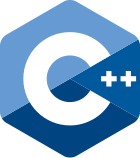c++
c++ is a general-purpose programming language. It has imperative, object-oriented and genericprogramming features, while also providing facilities for low-level memory manipulation.It was designed with a bias toward system programming and embedded, resource-constrained and large systems, with performance, efficiency and flexibility of use as its design highlights.
 | |
| Paradigm | Multi-paradigm: procedural, functional, object-oriented, generic[1] |
|---|---|
| Designed by | Bjarne Stroustrup |
| First appeared | 1985 |
| Stable release |
ISO/IEC 14882:2017 / 1 December 2017
|
| Typing discipline | Static, nominative, partially inferred |
| Implementation language | C++ or C |
| Filename extensions | .C .cc .cpp .cxx .c++ .h .hh .hpp .hxx .h++ |
Language
The C++ language has two main components: a direct mapping of hardware features provided primarily by the C subset, and zero-overhead abstractions based on those mappings. Stroustrup describes C++ as "a light-weight abstraction programming language [designed] for building and using efficient and elegant abstractions";[6] and "offering both hardware access and abstraction is the basis of C++. Doing it efficiently is what distinguishes it from other languages".[39]
C++ inherits most of C's syntax. The following is Bjarne Stroustrup's version of the Hello world program that uses the C++ Standard Library stream facility to write a message to standard output:[40][41]
1 #include <iostream>
2
3 int main()
4 {
5 std::cout << "Hello, world!\n";
6 }
Object
C++ introduces object-oriented programming (OOP) features to C. It offers classes, which provide the four features commonly present in OOP (and some non-OOP) languages: abstraction, encapsulation, inheritance, and polymorphism. One distinguishing feature of C++ classes compared to classes in other programming languages is support for deterministic destructors, which in turn provide support for the Resource Acquisition is Initialization (RAII) concept.
class
Class: The building block of C++ that leads to Object Oriented programming is a Class. It is a user defined data type, which holds its own data members and member functions, which can be accessed and used by creating an instance of that class.
- A Class is a user defined data-type which has data members and member functions.
- Data members are the data variables and member functions are the functions used to manipulate these variables and together these data members and member functions defines the properties and behavior of the objects in a Class.
- In the above example of class Car, the data member will be speed limit, mileage etc and member functions can be apply brakes, increase speed etc.
Inheritance
Inheritance allows one data type to acquire properties of other data types. Inheritance from a base class may be declared as public, protected, or private. This access specifier determines whether unrelated and derived classes can access the inherited public and protected members of the base class. Only public inheritance corresponds to what is usually meant by "inheritance".
Operator overloading
| Operator | Symbol |
|---|---|
| Scope resolution operator | :: |
| Conditional operator | ?: |
| dot operator | . |
| Member selection operator | .* |
| "sizeof" operator | sizeof |
| "typeid" operator | typeid |
C++ provides more than 35 operators, covering basic arithmetic, bit manipulation, indirection, comparisons, logical operations and others. Almost all operators can be overloaded for user-defined types, with a few notable exceptions such as member access (
. and .*) as well as the conditional operator. The rich set of overloadable operators is central to making user-defined types in C++ seem like built-in types.
polymorphism
Polymorphism enables one common interface for many implementations, and for objects to act differently under different circumstances.
C++ supports several kinds of static (resolved at compile-time) and dynamic (resolved at run-time) polymorphisms, supported by the language features described above. Compile-time polymorphism does not allow for certain run-time decisions, while runtime polymorphism typically incurs a performance penalty.
see also
No comments:
Post a Comment